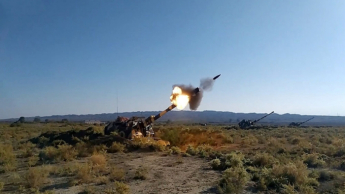INTERVIEW: Could China and Russia start World War III over Japan?- Japanese expert answers

Hiroshi Yamazoe, senior researcher at the National Institute for Defense Research (Tokyo), gave an interview to Baku Tribune.
Hiroshi Yamazoe, senior researcher at the National Institute for Defense Research (Tokyo), gave an interview to Baku Tribune.
- China and Russia may start a third world war over territorial claims against Japan. This opinion was expressed in an article in The National Interest by the head of the Department of Naval Strategy. J.C. Wiley of the United States Naval Academy James Holmes. According to him, Moscow and Beijing may lay claim to some Japanese lands. How would you comment on this? What was the reaction in Japan?
- The point of Dr James Holmes is that we can avoid a future scenario of escalation if we now intensify defense efforts recognizing the risks increasing now. The risks are assessed from incentive to change the status quo and confidence in capabilities to do so. I think in East Asia the case of China is much more serious than that of Russia, because China shows the intention to use force to gain control on strategically important islands including the Senkaku Islands under the Japanese administration, and rapidly increases military capabilities to fight foreign forces. Even if China does not want a war now, when an unintended incident should take place and China should believe a military operation is a good solution, the situation would be very dangerous. We have been making efforts to prove a military operation is never a favorable option given the U.S.-Japan defense capabilities, and to reduce risks of miscalculation via constant dialogues with all the relevant players.
- Recently, the Japanese police have warned of impending anti-Russian actions, the Russian Embassy in Japan reported on its Facebook page. "Representatives of the Japanese police informed about the preparation of a series of anti-Russian protest actions by Japanese ultra-right organizations on August 9 in the area of the Russian embassy in Japan, the Russian trade mission in Japan, the Russian consulates in Sapporo, Osaka and Niigata," the statement said. Experts point to growing irritation in Japanese society over the unresolved dispute with Moscow over the South Kuriles. From time to time, such promotions are held. Who and why incites hatred of Russia in Japan, in your opinion?
- Such demonstration of complaint is regular but never violent or large-scale. Many people were disappointed by Russian repeated messages to reject the island issues talks despite unprecedented multiple efforts by the former Prime Minister Abe Shinzo to increase mutual trust. But the majority of people do not start a direct action toward the Russians, given more serious and imminent issues around here. Whereas bitter memories about the Soviet Union will never disappear, the Japanese can do business and diplomacy with the Russians to the extent they can trust the partner.
- At the end of July, Prime Minister Mikhail Mishustin visited the largest of the South Kuril Islands - Iturup. During the visit, the official spoke about "unique and unprecedented" proposals to involve Japan in the Kuril economy. But in Tokyo they were not appreciated at all. The Japanese Foreign Ministry expressed strong dissatisfaction with Mishustin's proposals, and the country's political elite seriously thought about revising its policy towards Russia - and clearly not in a positive direction for Moscow. What caused the scandal and how will it affect the prospects for signing the long-awaited peace treaty between Russia and Japan?
- The Japanese official position is that Japan has never agreed to transfer the ownership of “the Four Islands” of the Northern Territories to Moscow. Therefore the joint development of these islands should not be based on the Russian ownership. Please understand that we have this fundamental difficulty and still can find a way to proceed such as cooperation on tourism and waste-treatment facilities. A step for mutually beneficial cooperation can be a step for a peace treaty.
- According to Japanese media reports, on July 29, the largest Japanese banking and financial group Mitsui Sumitomo Banking Corporation, as well as the State Bank for International Cooperation of Japan (JBIC) made the final decision to invest $ 2 billion in the well-known Arctic LNG-2 project of an independent producer of natural gas in Russia PJSC "Novatek". Japan is making huge investments in the Russian fuel and energy complex to ensure its energy security. Even the US anti-Russian sanctions do not scare her. Serious government agencies are involved in risk insurance. In your opinion, why did Japan decide to make large investments in the fuel and energy complex of Russia?
Russia already provides around 10% of Japan’s energy imports after the long-term efforts both in Russia and Japan. An appropriate balance of share supports Japan’s energy security. U.S. sanctions are there but have not yet prohibited everything. Still, the conditions would be better if the U.S.-Russian relations get better and the sanctions decrease. Japan, while issuing the joint G7 messages to warn the Russian behavior we do not accept, maintains multi-faceted and balanced ties with Russia.
- Do you think the US can put pressure on Japan to withdraw from this deal with Russia? If the Novatek project and the “northern” logistics direction are implemented, will this make a significant contribution to increasing the energy security of Japan?
- If something serious happens to affect the U.S.-Russian relations, the U.S.-Japan talks will include a topic of how to deal with this. If U.S. and Japan perceive Russian actions as fundamentally undermining the existing order, the situations would be worse and could affect even Japan’s energy deals.
- The Japanese government has published a draft state strategy for reforming the country's energy sector until 2030 The document says that Japan intends to dramatically increase the share of renewable energy sources (RES) in the energy balance in the next ten years, and it plans to achieve this - and this is the main thing - by refusing from the use of energy grades of coal and liquefied natural gas. What can you say about this project? Is it possible to achieve the above goals? And the most important question - How is Tokyo going to increase nuclear generation so dramatically?
- All the nuclear generation plants were suspended in March 2011 when a large earthquake seriously hit one plant. Since then the Japanese have been cautious and still the majority of nuclear generation is not yet resumed. The target of 20-22% means Japan needs to run all the 27 plants with higher working rate, not necessarily building new ones. That is difficult enough. I think we will increase renewable energy sources and meanwhile use nuclear generation to supplement the energy demands reducing CO2 emission.
Interviewed by Elnur Necefli
The Rocket and Artillery formations of the Azerbaijan Army conduct live-fire exercises in accordance with the combat training plan for 2021, the Ministry of Defense of Azerbaijan told Baku Tribune.
LAST NEWS






.jpg&h=67&w=67&zc=1&q=100)













